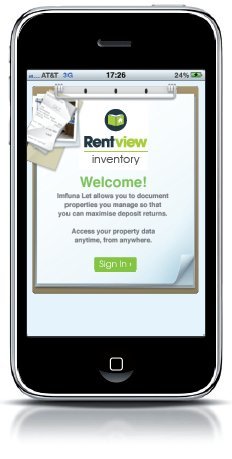Benefits for your agency using Rentview
Rentview Inventory
Www.Rentview.com Set to Launch Inventory App for both App store and Android Smart phones

Summary: A brief look at how letting agents can reduce time and money spent on inventory reporting for landlords /tenants and reduce likelihood of disputes over deposit retention related to inventory condition.
The role of inventory in property management: Inventory is a factor involved in any tenancy agreement, a tenant must be happy with the property contents and its condition throughout before entering into a tenancy agreement and a landlord must do same when ending the tenancy and returning the security deposit to the departing tenant.
Problems that arise over Inventory in Property management: Often, a tenant and landlord or property manager may come into conflict over issues related to inventory, Irishlandlord.com writes ‘One of the most common areas of dispute between landlord and tenant relates to the contents of the property and its condition’, unfortunately the current practices for recording inventory of a property is extremely out dated and will prove very difficult to stand up in a legal dispute.
The Rentview Inventory App: Set to launch on the app and android stores in just over two weeks Rentview will set a new standard in the residential lettings market throughout Ireland for protecting both landlords , agents and tenants by using modern technology to provide detailed inventory reports that can be carried out on any Smart phone! This will save you valuable time and money as a property manager!
But where does the info go and how will I protect us against claims? But wait that’s not all, current and future users of the Rentview property management software will be able to upload their reports (VIA The Cloud) onto their Rentview accounts for safe storage. Access can be shared with a landlord or tenant by agent. If either party have anything to add to the report they can do so and a copy is then printed before a tenancy commences signed by both tenant and property manager.
About Rentview: Rentview is an internet based property management software solution designed by two former property managers with over 12 years experience in the Irish market. The software was developed to Manage, Build and Retain an agencies property portfolio, no matter what the size! Rentview Inventory only furthers our goals of saving property mangers hours of time per week, potential disputes with tenants and decreasing the overall costs associated with managing a property.
Recession in Ireland affects rent
The current property market in Ireland is stabilising since the dramatic effect the recession had on the market over the last few years, there is in fact more and more people looking to rent a property rather than buy with the difficulties in securing mortgages growing.
The Irish market unfortunately is seeing increased problems with tenant’s ability to make their rental payments on time with thousands of tenants falling into arrears and the PRTB is already backlogged with tenancy and landlord disputes. It can take up to six months for a case to have its first hearing in an effort to resolve issues. With the current overload of disputes this can result in a potential large loss for property owners.
Non-paying tenants are every agency and landlord’s nightmare, with more and more tenants entering into tenancy agreements and not being able to meet the terms (many due to issues beyond their control i.e. job losses). Landlords and other property owners can potentially lose many months rent through problem tenants as the legal procedure is a very slow process in Ireland.
Why are there so many tenants defaulting on rent?
The property market is becoming more and more competitive now. Agencies are always keen to let their properties as soon as possible. The process of finding the best tenant and monitoring payments correctly and communicating with tenants can be too hazy and in adequate at times. Tenants will often string a landlord or agent on for weeks promising to pay the rent or paying it off in small sums and if the landlord does decide to legally pursue the tenant it will be a further 6+ weeks before the landlord is rid of the problem tenant and able to re-let the property.
Some obvious answers here are the recession in Ireland leading to a huge loss of jobs in the Irish economy and many genuine cases of tenants entering into an agreement and then suffering a severe reduction in their income. However, many of the tenants causing headaches for property managers and landlords are simply abusing the legal system to stay in properties and not pay their rent. I have heard of one particular case where a tenant has bounced from property to property in the same area as he leaves each landlord in arrears and facing a significant loss of income. How can tenants get away with this?
Other reasons can be poor relationships and communication between property managers and tenants leading to disputes over rents and deposits and more cases being brought to the PRTB.
Due to the recession in Ireland, letting agents and property managers must work twice are hard to win landlords and get good tenants.
Choosing the right tenant and managing your rental payments
Choosing the right tenant
As an experienced property manager the most frustrating part of the job is chasing the continuously late-paying tenants. If you’re a property manager with a portfolio of property, a landlord with a portfolio or even a landlord of just one property, you will have had to deal with this problem, most likely.
The continuous calls which get unanswered, texts that don’t get replied, emails with ‘send receipt’ not accepted or letters not getting a response the majority of you will have experienced this.
There is just nothing more frustrating, but can we as property managers eliminate this? Well in most cases we can try our best to eliminate this stress as much as possible by choosing the right tenant.
To prevent late payments:
– In what ever lease you are using, if not already in the lease, place a late penalty clause. When going through the lease prior to signing with your tenant(s) make it clear that this will be enforced. Add a clause that for every day late the penalty will be 20 euro. This way at least if it’s late, you’re getting compensated and in today’s climate late rent could cause you or your client to have bank charges with unpaid direct debits or standing orders.
– Reference check your tenants; make sure you get legitimate references. If the reference is from an agency don’t just take it as gospel. Call up the agency and confirm it if it’s from a private landlord and if they only have a mobile number, ask the referee if is it possible to call them on a land line. Any tenant can give you a reference written from a friend with a mobile number on it but they won’t be as quick to give a land line on it. Most landlords will gladly back up the reference with a land line – after all they are in the same position as you.
– But what if they won’t? It can happen. Why not Google their mobile number, more than likely if it’s a mobile number on the reference it will be the same mobile number they use to advertise the property. This way you can confirm at least that it is a real landlord.
– Ask for a bank statement as part of your referencing process to see if the tenant is able to afford the rent in line with salary or bank balance.
– Insist on a standing order being set up, you can find all blank banks standing orders on the banks website in PDF format, which you can print and bring along to a tenancy sign up.
– Fill it out and drop it to the bank personally or post it (a standing order for a particular bank can be dropped into any branch which will set it up on the banking system).
Now just watch the money coming into your account.
Beware that a standing order may not reach you on the same day as it is due. If your tenant banks with a different bank than you do, it may take up to 3 working days to reach you. To solve this problem, insist that the payment date on the standing order is set accordingly if it needs to reach you on its due date.
What if your tenant(s) have not rented before?
Well is it worth the risk? Are they the only interested party? Why is that?
Well these are the questions you need to ask yourself, don’t just assume because they come across as nice people that they will be good tenants. If the only tenants interested in your property don’t have a previous landlord reference is it worth the risk? Why are they the only interested party? Well it could be for a number of reasons;
–The property could be overpriced and the only tenants that are interested are interested because they can’t find anybody else to take a risk on them. Look at the market in your area, view photos online and be honest with yourself. Is your property to the same spec? If not, stop wasting time and money and adjust the price to what the market will pay.
-If your property is something that needs refurbishment, DO IT. It will pay off in the long run. You would be amazed at what a couple of months rent can do to a property and it could save you all the hassle in the long run by placing bad tenants into a property that good tenants wouldn’t touch.
If you go with a tenant who has no previous references, look for a guarantor letter to give more protection if something goes wrong. Otherwise, try getting a higher deposit as a way of good faith.

Tenant chosen
Hopefully your reference checking and selection of tenants will ensure all you have to do is watch the rent coming in.
Managing your rental payments
Keeping a eye on due rents
This is the most important part of being a property manager or a landlord insuring the rent is coming in on time every month. Just because a tenant pays the rent on time every month for 9 months straight it doesn’t mean month 10 is going to be on time or paid at all.
Case study:
I recently spoke with a landlord who had a great tenant in place for the previous 18 months, the rent was on time every month and the landlord stopped keeping his eye on his bank account. This landlord got complacent and too comfortable with his tenant and rent coming on time. When the landlord checked his account there was 5 months rent missing. I mean come on! Even though the landlord only has one property, being a landlord is a business. I mean, if he was a shopkeeper he wouldn’t leave the store unmanned with the day’s takings in the till. Being a landlord or a property manager is the same thing taking your eye off the ball can have terrible results. Luckily for this landlord the tenant placed in the property was a well-referenced tenant whose standing order ran out of payments. He paid in full the following week.
The best way for an agency and even single property landlords to oversee due rental payments is to use software that does the hard work for you; tracking and managing it.

So what to do if a tenant doesn’t pay his rent on time.
What to do when it starts.
Know your local law and your rights as a landlord.
In most countries, laws covering rented property give the advantage to a tenant. So don’t make any rash decisions, don’t go in all guns blazing putting all the tenant’s belongings on the street and changing the locks. This will most likely put you in a worse position than where you first started.
Illegal evictions at the time might seem right, but in the end can lead it large fines and even being forced by court order to allow your tenant reoccupy the property.
No one wants a tenant with a chip on their shoulder.
Check up on your local law and act accordingly
In Ireland for example, you first must issue a 14 days rent arrears notice and deliver in person to the tenant or by registered post. The Rentview application will create this legal document at the touch of a button. In my experience, this will show the tenants you won’t stand for any messing and normally pay up or give notice to quit the property before it goes further.
If the tenant fails to pay the rent after 14 days you must issue an eviction notice (the amount of time varies from 28 days if a tenant is occupying the house less than 6 months to 100+ days if they are tenants are occupying the house for years+
Note that these letters act as legal papers and as such need to be written in a correct format. One error on the document can set you back and you must start over with a new notice period to your tenants. So make sure if sending these yourself and not taking on the expense of a professional, that you do it correctly.
Listening to a tenant’s promise that the rent will be paid in full at the end of the week and taking the tenant’s word is not good enough. Back yourself up by sticking to the law and insuring you act upon late rent immediately.
You may not want to act to harshly on the first late rent payment as you may feel you will damage your relationship. This is a business, so treat it like one.
We hope this will help you in choosing the right tenant and managing your rental payments.
